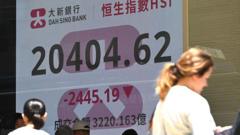**Asian stocks plummeted dramatically due to fears of a looming trade war, with significant impacts on economies reliant on US exports.**
**Asian Markets Suffer Historic Drop as Trump's Tariffs Trigger Trade War Fears**

**Asian Markets Suffer Historic Drop as Trump's Tariffs Trigger Trade War Fears**
**Major declines across Asian stock exchanges reflect mounting global economic concerns following US tariff announcements.**
Asian stock markets experienced their most significant declines in decades Monday, following the announcement of new tariffs by US President Donald Trump. The ripple effects were felt across the region, with major exchanges such as the Shanghai Composite index dropping as much as 8%, Hong Kong's Hang Seng falling over 13%, and Japan's Nikkei 225 closing down by 7.8%. Analysts characterized these movements as a "bloodbath," showcasing the vulnerability of Asian economies to global trade tensions.
European markets mirrored the downturn in Asia, showing early signs of weakness with banks and defense firms experiencing major declines. This turmoil follows last week's global market slumps triggered by Trump's tariffs, which range between 10% and 46% for various countries and goods. The fallout promises to be particularly detrimental to Asia's manufacturing economies that heavily rely on exporting to the US.
Countries such as Japan and South Korea now face significant tariffs of 26%, while Vietnam braces for a staggering 46% levy. Other nations on this tariff list include Cambodia (49%), Thailand (36%), and China, which will incur a total of 54% tariffs. Economists warn that a new regime of higher tariffs could stall economic growth and lead to a potential recession in the US, which would further damage Asian exports.
Investor sentiment in Asia's markets worsened as the continent began to catch up with the drastic losses experienced by their western counterparts. In mainland China, the Shanghai Composite concluded the day at 7.3% lower, while Taiwan’s stock market faced a historic plunge of 9.7%. The ASX 200 in Australia fell by 4.2% and South Korea's Kospi ended down by 5.6%, exacerbating an already volatile situation.
Concerns are growing that tariffs could prompt inflation and a recessionary environment. Leading financial institutions, including Goldman Sachs and JPMorgan, have revised their recession forecasts, estimating a 45% chance of a US economic downturn within the next year, with JP Morgan assessing a 60% likelihood for both the US and the global economy.
The turmoil poses a significant risk for countries like Vietnam and Bangladesh, which heavily depend on US markets. Many major US brands, such as Nike and Gap, produce key goods in Vietnam, while Bangladesh exports garments worth $8.4 billion annually to the US. With Trump’s announcement of a 37% tariff on Bangladeshi products, the prognosis for these economies remains dire.
Former US commerce undersecretary Frank Lavin noted that Asia will likely experience a disproportionate impact from the ongoing trade conflict, as the region sends a larger share of its exports to the US compared to other markets. China, Asia's largest economy, has responded with its own tariffs, intensifying the pressure on global markets.
As the global stock market faces significant challenges, experts predict a continuous rout ahead. With US futures indicating further declines, analysts are bracing for another turbulent trading session on Wall Street. The recent announcement of sweeping tariffs has already led global markets to denote trillions of dollars in losses, raising concerns about the economic implications of such protectionist measures.
European markets mirrored the downturn in Asia, showing early signs of weakness with banks and defense firms experiencing major declines. This turmoil follows last week's global market slumps triggered by Trump's tariffs, which range between 10% and 46% for various countries and goods. The fallout promises to be particularly detrimental to Asia's manufacturing economies that heavily rely on exporting to the US.
Countries such as Japan and South Korea now face significant tariffs of 26%, while Vietnam braces for a staggering 46% levy. Other nations on this tariff list include Cambodia (49%), Thailand (36%), and China, which will incur a total of 54% tariffs. Economists warn that a new regime of higher tariffs could stall economic growth and lead to a potential recession in the US, which would further damage Asian exports.
Investor sentiment in Asia's markets worsened as the continent began to catch up with the drastic losses experienced by their western counterparts. In mainland China, the Shanghai Composite concluded the day at 7.3% lower, while Taiwan’s stock market faced a historic plunge of 9.7%. The ASX 200 in Australia fell by 4.2% and South Korea's Kospi ended down by 5.6%, exacerbating an already volatile situation.
Concerns are growing that tariffs could prompt inflation and a recessionary environment. Leading financial institutions, including Goldman Sachs and JPMorgan, have revised their recession forecasts, estimating a 45% chance of a US economic downturn within the next year, with JP Morgan assessing a 60% likelihood for both the US and the global economy.
The turmoil poses a significant risk for countries like Vietnam and Bangladesh, which heavily depend on US markets. Many major US brands, such as Nike and Gap, produce key goods in Vietnam, while Bangladesh exports garments worth $8.4 billion annually to the US. With Trump’s announcement of a 37% tariff on Bangladeshi products, the prognosis for these economies remains dire.
Former US commerce undersecretary Frank Lavin noted that Asia will likely experience a disproportionate impact from the ongoing trade conflict, as the region sends a larger share of its exports to the US compared to other markets. China, Asia's largest economy, has responded with its own tariffs, intensifying the pressure on global markets.
As the global stock market faces significant challenges, experts predict a continuous rout ahead. With US futures indicating further declines, analysts are bracing for another turbulent trading session on Wall Street. The recent announcement of sweeping tariffs has already led global markets to denote trillions of dollars in losses, raising concerns about the economic implications of such protectionist measures.






















